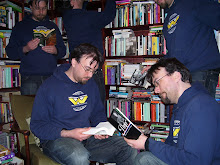 |
| Illustration by Isabel Samaras |
 |
| Illustrations above and below by paintings by John John Jesse |
These made me want to see what other Actes Noirs looked like, and I'm glad I did. Though I'm not sure that limiting the artwork to a small oval is always the best treatment for it, it does give the series the feeling of a number of alarming and creepy scenes glimpsed through a keyhole. As a non-French-speaker, I can't work out who the artists and designers for these books are, but here are those that most struck me.
UPDATE: However, the inestimably wondrous Derek has done some sleuthing, and found several of the artists responsible, including those for the Larssons above, so I've added their details under the relevant covers.
 |
| This and a number of the other illustrations are the work of Nicoletta Ceccoli |
I can't tell you how much I prefer this approach to the usual UK/US crime novel cover cliches of scratched-up, oversized type, murky stock photos of hands/mouths/silhouettes, and random blood spatter.































12 comments:
Always up for a Google challenge:
Les hommes qui n'aimaient pas les femmes -- cover illustration by Isabel Samaras
La fille qui rêvait d'un bidon d'essence et d'une allumette and La reine dans le palais des courants d'air -- cover paintings by John John Jesse
Le prédicateur -- cover illustration by Nicoletta Ceccoli
4 months ago I could've told you quickly enough since I worked in a bookstore in Quebec where we sold most of those titles... But now I'm in England!
Actes Sud (and their North-American partners Leméac) have an excellent tradition of cover-design in their novel catalogue as well. Unfortunately (and this tends to happen a lot in french — when they do slap an image, most big publishing companies like Flammarion, Grasset, and Gallimard only add an image in the pocket format), they always have the same frame for their covers: same size, same font, same color palette. I think this is only seen in paperback classics collections in the English book world. It does create a nice unity within the publishing house's collection, but I find it sometimes becomes redundant.
Anyhow, here are some elegant covers in the Leméac / Actes-Sud literature catalogue. Their pocket books are called Babel, I've only included one here (Alberto Manguel) because they tend not to be as good as their large format books:
http://amzn.to/gr0czQ
http://amzn.to/fefgMx
http://amzn.to/g8BaAl
http://amzn.to/fBM7U6
http://amzn.to/dSRf3G
http://amzn.to/fqFefX
http://amzn.to/iiyPDi
Some of these illustrations I like and some I really don't, but the general pulpy/creepy aesthetic and simple, uniform design definitely gets a thumbs up from this direction!
I'm sure I've got at least one book or comic knocking about somewhere featuring work by the person who does those alien-lookin' big-eyed gothy children, but I don't recall his/her name simply because I don't like them much...
The non-keyhole illustration on that first Larsson cover is superb - almost makes me want to read it (and hopefully not just because it's got a boob on the cover). As you say, a whole other universe from the monumentally boring/thoughtless covers books like this seem to get in the English-speaking world.
these look like someone decided to browse through deviantART or beinArt Surreal Art Collective, take whatever they liked or thought would fit the book, cropped the image and pasted on the cover. it's actually pretty amazing that the publishing house was able to afford to pay all those artists for the rights to use their artworks on the covers. anyhow, it's a nice way to popularize not only the authors but the artists as well.
Some of the child ones are very similar to the work of Mark Ryden - the children with big eyes, sallow skin, added blood. I love Ryden and these books covers are equally wonderful.
Derek: Fine work! I'll add that info to the post--thank you.
Chasch: Thank you for those links--some really nice covers there. Are the books in reality that unusual (in UK/US/Aus) tall and thin shape?
Hazel: I hadn't thought of Mark Ryden--nice one. A number of them really do look like his work. I think, though, that they're Nicoletta Ceccoli, as identified by Derek.
Ben: Is Ryden the chap you were thinking of? In any case, I'm with you--even if some of the illustrations aren't quite my thing, the overall approach is definitely good.
Anon: I hadn't thought of deviantART or the like, but you're right, a lot of these images would fit that sort of style.
Google Chrome will automatically translate (after a fashion) any non-English web page.
Allows much amusing browsing in foreign book catalogs.
I was just in Paris and when browsing in some bookstores noticed the complete absence of the Serie Noir... What happened?
It's odd--they do seem to still exist, but have only put out 10 books in the last year, and the most recent few have ugly covers. And their website hasn't been updated in 7 years.
I didn't think you'd notice! Yes, the books are surprisingly thin and tall in shape (they're also rather small, for "grands formats"). I must say it still works quite well in terms of making a beautiful object, however it makes for a rather rigid reading experience, especially with short books (the pages and binding are quite stiff). As I remember the Actes Noir series are made on another format, they're rather larger and the width of the book is more proportionate.
The girl on the second cover looks exactly like Wednesday (Christina Ricci) in the Addams Family movies. Completely off topic, I know, but I couldn't help it! :)
It's an uncanny resemblance, isn't it?
Bunker is my favorite. it really captures what an illustration feels like when confined, and trapped within such a small oval.
Post a Comment